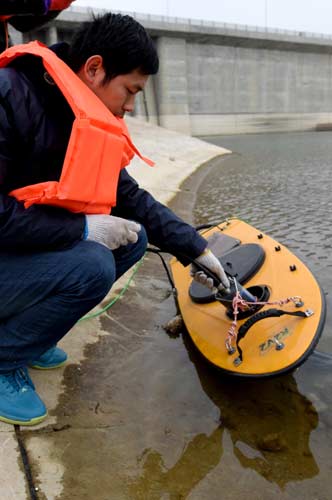Call for more action to keep Beijing's water supply clean
China Daily, March 19, 2015 Adjust font size:
Officials have been urged to do more to protect the environment at a reservoir that supplies water to Beijing through the South-to-North Water Diversion Project.
|
|
|
A water protection official monitors quality levels at the source of the central route of the South-to-North Water Diversion Project in Nanyang, Henan province, on March 4. [Photo/Xinhua] |
Mu Weimin, the Party chief at Nanyang, Henan province, said that safeguarding the water quality at Danjiangkou Reservoir is a key task that should receive more attention from the city government.
A number of steps have already been taken, however.
"We have shut down more than 660 poultry and livestock farms around the reservoir to prevent pollution," Mu said.
The diversion project has eastern, central and western routes and is designed to take water from the country's longest river, the Yangtze, to drought-prone areas in North China. The reservoir in Henan and Hubei provinces is the source for the central route.
The route began supplying water to the capital and Tianjin through a 1,432-km canal in December.
"To make sure the water is clean, the city government has removed 40,000 cages that were used to raise fish from the reservoir," Mu said.
Officials encouraged those who had to give up their fish farms to switch to planting trees, growing mushrooms and cultivating herbs for traditional medicine, he added.
However, many residents lost money because they had to sell their cages and fish at low prices, according to Xin Xiyu, 64, who was relocated to Danjiangkou when her village was submerged because of the reservoir in 2009.
"The authorities should consider offering them compensation," she said.
Xin planted walnut trees on rented land and bred sheep and cows after the move.
"I can support my family, but this is not a common situation for the thousands of people who had to move," she said.
Wei Xiaodong, the Party chief of Hebi, Henan province, which is located on the route, said the local government will step up supervision.
"We will monitor the quality every few hours each day to make sure it is clean," he said.
There are more than 200 sluice gates along the canal that can be used to hold back the flow in case of an emergency, he added.
